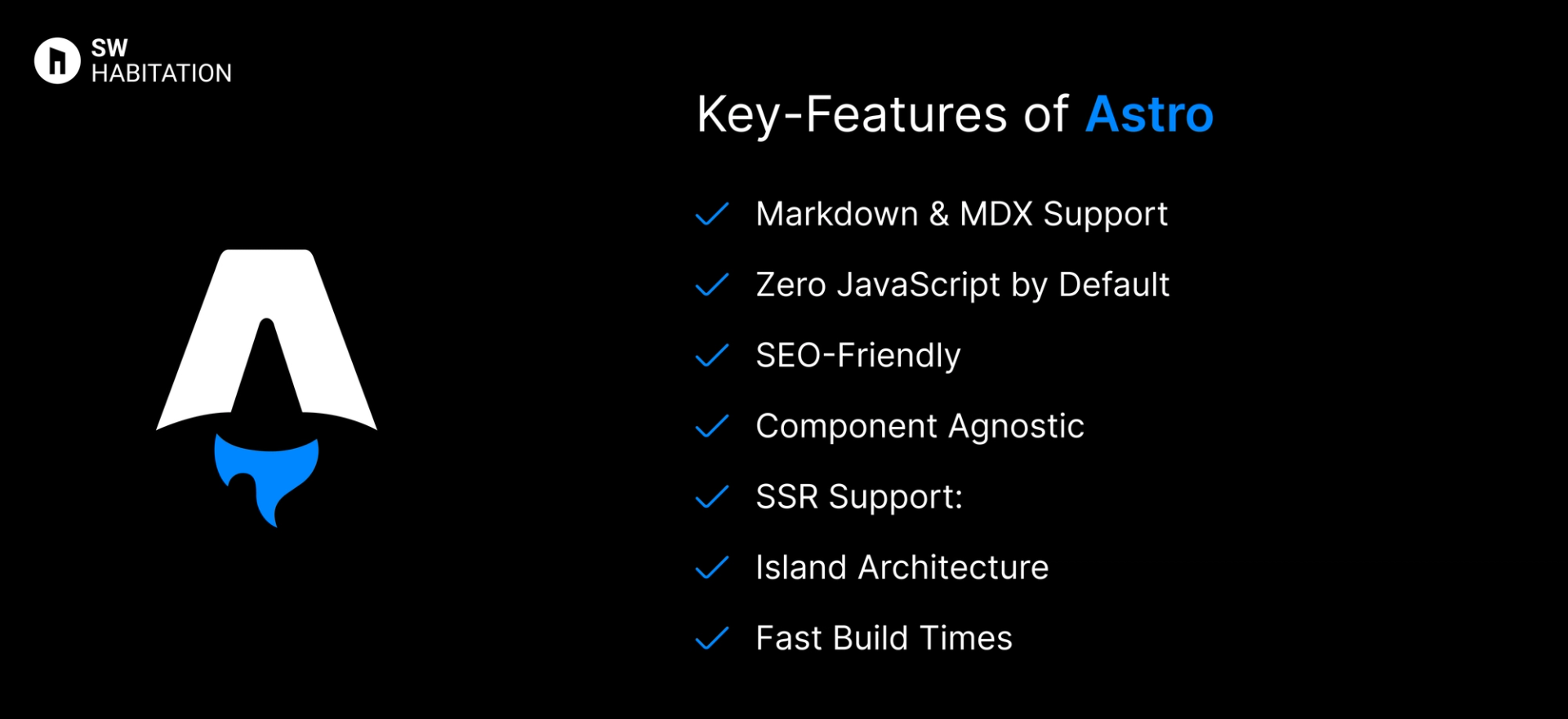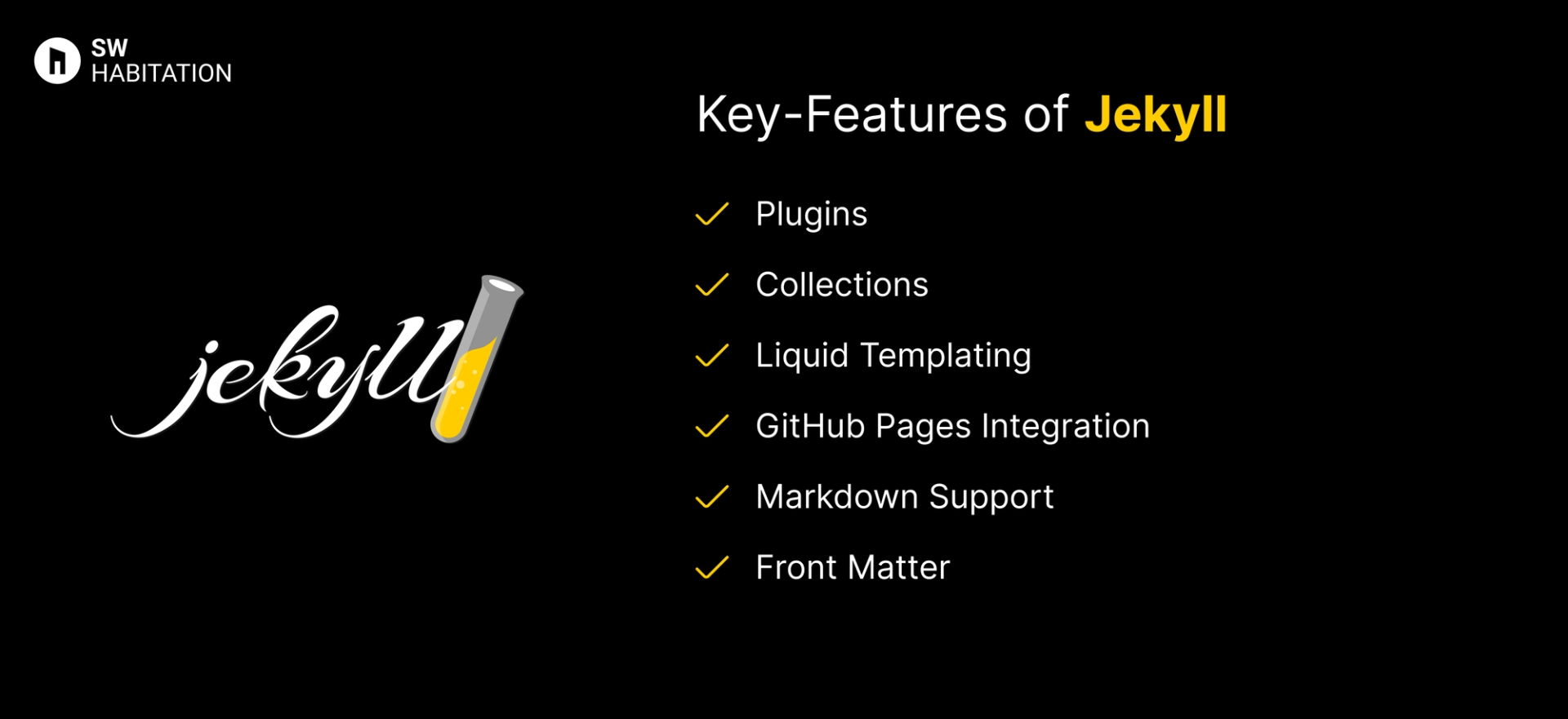Astro vs. Jekyll

Astro

Jekyll
Have you ever been to a website that loads super fast? Chances are it uses an SSG (Static Site Generator). It’s a tool that builds your site ahead of time, so when someone visits, they get the page instantly. No waiting around for things to load it’s just there.
What is Astro?
Astro is a modern Static Site Generator that focuses on delivering faster websites by sending as little javaScript as possible.
Unlike traditional javaScript frameworks, Astro renders pages at build time, creating static HTML that gets served directly to users.
One of its standout features is the island architecture, which lets you selectively hydrate only the parts of the page that need interactivity means you only load javaScript when it’s absolutely necessary.
Key Features of Astro


- Markdown & MDX Support: Write content with ease using Markdown or MDX.
- Zero JavaScript by Default: No javaScript is sends to the client unless absolutely needed.
- SEO-Friendly: Built-in optimisations like automatic sitemap generation.
- Component Agnostic: Supports React, Vue, Svelte, and more — all in the same project!
- SSR Support: Optional server-side rendering if needed.
- Island Architecture: Load JavaScript only for interactive components.
- Fast Build Times: Optimised for super-fast builds, even for large websites.
Advantages of Astro
- Great for Content-Driven Sites: Perfect for blogs, documentation, and portfolios.
- Developer-Friendly: Clean syntax and great tooling make development a breeze.
- Minimal Setup: Simple config with automatic optimisations.
- Flexible and Versatile: Use multiple frameworks in one project.
- Blazing Fast Performance: Less javaScript means faster load times.
Disadvantages of Astro
- Limited Dynamic Content: Out of the box, it’s more static-focused. Dynamic content needs extra handling.
- Newer Ecosystem: Fewer plugins and community resources compared to older SSGs.
- Learning Curve: Island architecture might take some time to get used to.
What is Jekyll?
Jekyll is an open-source static site generator built with Ruby. It takes your text files (written in Markdown), processes them through templates, and generates a static website that you can deploy anywhere.
No databases, no server-side scripting it just pure HTML, CSS, and JavaScript. It’s super popular among developers, especially for creating personal blogs and documentation sites.
Key Features of Jekyll


- Plugins: Extend functionality with a rich plugin ecosystem.
- Collections: Organize content beyond just posts and pages.
- Liquid Templating: Use Liquid, a simple templating language, to customize your site.
- GitHub Pages Integration: Seamless deployment on GitHub Pages.
- Markdown Support: Write content in Markdown, and Jekyll handles the rest.
- Front Matter: Easily add metadata like titles, tags, and layout options.
Advantages of Jekyll
- Highly Customizable: Tweak layouts, templates, and styles to make the site your own.
- Active Community: Tons of tutorials, plugins, and themes to explore.
- Simplicity: No database, no backend — just Markdown and templates.
- GitHub Pages Friendly: Direct integration with GitHub Pages means free hosting and automatic deployment.
- Perfect for Blogs: Designed with blogging in mind, making it easy to manage posts.
Disadvantages of Jekyll
- Build Times: For very large websites, build times can get a bit slow compared to newer tools.
- Limited Dynamic Content: Since it’s static, things like user authentication or live updates need extra work.
- Requires Ruby: You’ll need Ruby installed on your system, which can be a hurdle for some.
Comparison Between Astro vs Jekyll
Use Cases of Astro
- SEO-Focused Projects: Ships with built-in SEO optimisations.
- Content-Heavy Sites: Blogs, marketing sites, and documentation hubs.
- Multi-Framework Projects: Mix and match React, Vue, and Svelte in one codebase.
- Developers Seeking Speed: Fast build times and minimal runtime JavaScript.
Use Cases of Jekyll
- Portfolios: Showcase your work with a simple, fast, and customizable site.
- GitHub Projects: The perfect companion for project documentation hosted on GitHub.
- Documentation Sites: Clean, simple, and easy to organize docs.
- Personal Blogs: Its blogging-focused features make it a favorite for tech blogs.
Other Resources
Conclusion
Static Site Generators are a big game changer if you’re looking to build a website that’s fast, secure, and easy to maintain. Whether you’re launching a personal blog, portfolio, or a business website, they give you the freedom to focus on what really matters, your content and your users without all the extra complexity.
The best part? You’re not locked into one way of doing things. You can choose the tools and tech you’re most comfortable with, and scale things up as your site grows. From lightning-fast load times to better SEO and easy hosting, SSGs make the whole process smoother.
At the end of the day, it comes down to what fits your workflow and goals best. Pick the one that feels right to your requirements, and you’ll be well on your way to creating a beautiful, high-performing website that you’re proud of 🙌
Frequently asked questions
Is Astro great for blogs and docs?
With support for Markdown and MDX, Astro is a fantastic choice for documentation sites, blogs, and other content-heavy websites
Does Astro support SSR?
Yes, You can use Server-Side Rendering (SSR) for dynamic content, or stick to static generation for blazing fast websites. Astro provides flexibility to choose the best approach.
Can I use React or Vue with Astro?
Yes, Astro supports React, Vue, Svelte, and many other frontend frameworks. You can even mix and match them on the same page.
Why is Astro so fast?
Astro uses HTML-first rendering, so it ships static HTML by default and only hydrates interactive components when necessary, leading to blazing fast performance.
Is Jekyll easy to set up?
Yes, Jekyll is developer-friendly and has great documentation. However, it does require Ruby and some command-line usage to set up and deploy.
Can I host Jekyll on GitHub Pages?
Yes, Jekyll integrates seamlessly with GitHub Pages, allowing you to host your site for free directly from your GitHub repository.
Does Jekyll require a database?
No, Jekyll is file-based, meaning your content is stored as Markdown or HTML files. It compiles everything into static files, so there’s no need for a database.
What is Jekyll good for?
Jekyll is perfect for building blogs, documentation sites, portfolios, and personal websites. It’s highly optimized for Markdown and Liquid templating.
